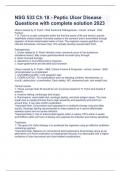Nsg 533 ch 18 - Study guides, Class notes & Summaries
Looking for the best study guides, study notes and summaries about Nsg 533 ch 18? On this page you'll find 8 study documents about Nsg 533 ch 18.
All 8 results
Sort by
NSG 533 Ch 18 Questions with complete solution 2023
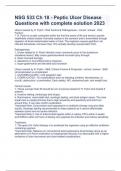
-
NSG 533 Ch 18 questions and answers verified 2024
- Exam (elaborations) • 5 pages • 2024
- Available in package deal
-
- $12.99
- + learn more
NSG 533 Ch 18 questions and answers verified 2024
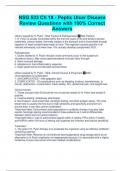
-
NSG 533 Ch 18 - Peptic Ulcer Disease Review Questions with 100% Correct Answers
- Exam (elaborations) • 5 pages • 2024
-
- $10.99
- + learn more
Ulcers caused by H. Pylori - Risk Factors & Pathogenesis Risk Factors: 1. H. Pylori is usually contracted within the first few years of life and tends to persist indefinitely unless treated. Normally resides in the stomach and is transmitted through ingestion of fecal-contaminated water or food. The organism causes gastritis in all infected individuals, but fewer than 10% actually develop symptomatic PUD. Pathogenesis: 1. Ulcers related to H. Pylori infection more commonly occur in the duod...
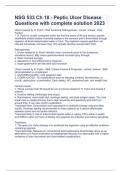
-
NSG 533 Ch 18 - Peptic Ulcer Disease Questions with DETAILED complete solution 2023/2024
- Exam (elaborations) • 5 pages • 2024
-
Available in package deal
-
- $10.99
- + learn more
NSG 533 Ch 18 - Peptic Ulcer Disease Questions with DETAILED complete solution 2023/2024 Ulcers caused by H. Pylori - Risk Factors & Pathogenesis - correct answer Risk Factors: 1. H. Pylori is usually contracted within the first few years of life and tends to persist indefinitely unless treated. Normally resides in the stomach and is transmitted through ingestion of fecal-contaminated water or food. The organism causes gastritis in all infected individuals, but fewer than 10% actually dev...
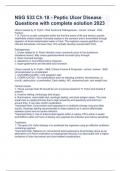
-
NSG 533 Ch 18 - Peptic Ulcer Disease Questions with complete solution 2023
- Exam (elaborations) • 5 pages • 2023
-
Available in package deal
-
- $13.49
- + learn more
NSG 533 Ch 18 - Peptic Ulcer Disease Questions with complete solution 2023 Ulcers caused by H. Pylori - Risk Factors & Pathogenesis - correct answer Risk Factors: 1. H. Pylori is usually contracted within the first few years of life and tends to persist indefinitely unless treated. Normally resides in the stomach and is transmitted through ingestion of fecal-contaminated water or food. The organism causes gastritis in all infected individuals, but fewer than 10% actually develop symptomat...
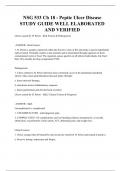
-
NSG 533 Ch 18 - Peptic Ulcer Disease STUDY GUIDE WELL ELABORATED AND VERIFIED
- Exam (elaborations) • 8 pages • 2023
-
- $8.79
- + learn more
NSG 533 Ch 18 - Peptic Ulcer Disease STUDY GUIDE WELL ELABORATED AND VERIFIED Ulcers caused by H. Pylori - Risk Factors & Pathogenesis ANSWER : Risk Factors: 1. H. Pylori is usually contracted within the first few years of life and tends to persist indefinitely unless treated. Normally resides in the stomach and is transmitted through ingestion of fecal-contaminated water or food. The organism causes gastritis in all infected individuals, but fewer than 10% actually develop symptomatic P...
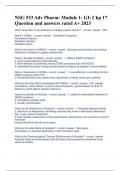
-
Package Deal of NSG 533 Question and answer rated A+ 2023
- Package deal • 7 items • 2023
-
- $35.49
- + learn more
NSG 533 Chapter 43 Diabetes Mellitus Question and answers 100% correct 2023 Exam (elaborations) NSG 533 Adv Pharm: Module 1: GI: Chp 17 Question and answers rated A+ 2023 Exam (elaborations) NSG 533 Ch 18 - Peptic Ulcer Disease Questions with complete solution 2023 Exam (elaborations) NSG 533 Module 2 + 3 Question and answers 2023 verified
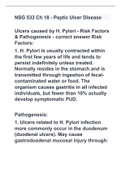
-
NSG 533 Ch 18 - Peptic Ulcer Disease with 100% complete solutions
- Exam (elaborations) • 21 pages • 2023
-
- $13.49
- + learn more
Ulcers caused by H. Pylori - Risk Factors & Pathogenesis Risk Factors: 1. H. Pylori is usually contracted within the first few years of life and tends to persist indefinitely unless treated. Normally resides in the stomach and is transmitted through ingestion of fecal-contaminated water or food. The organism causes gastritis in all infected individuals, but fewer than 10% actually develop symptomatic PUD. Pathogenesis: 1. Ulcers related to H. Pylori infection more commonly occur in the duo...

Study stress? For sellers on Stuvia, these are actually golden times. KA-CHING! Earn from your study resources too and start uploading now. Discover all about earning on Stuvia

